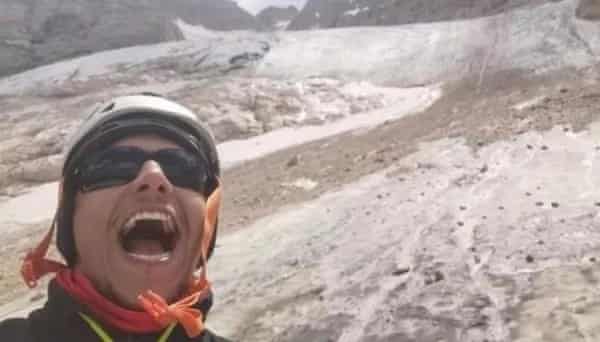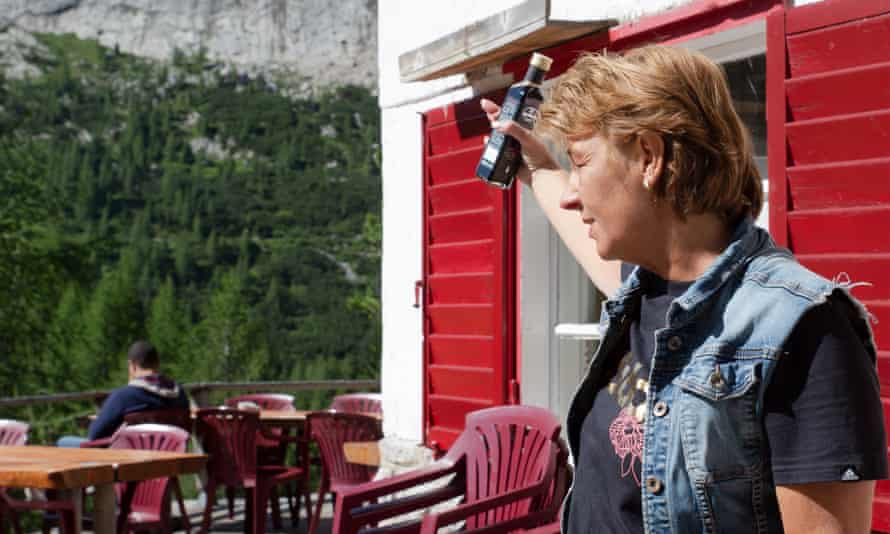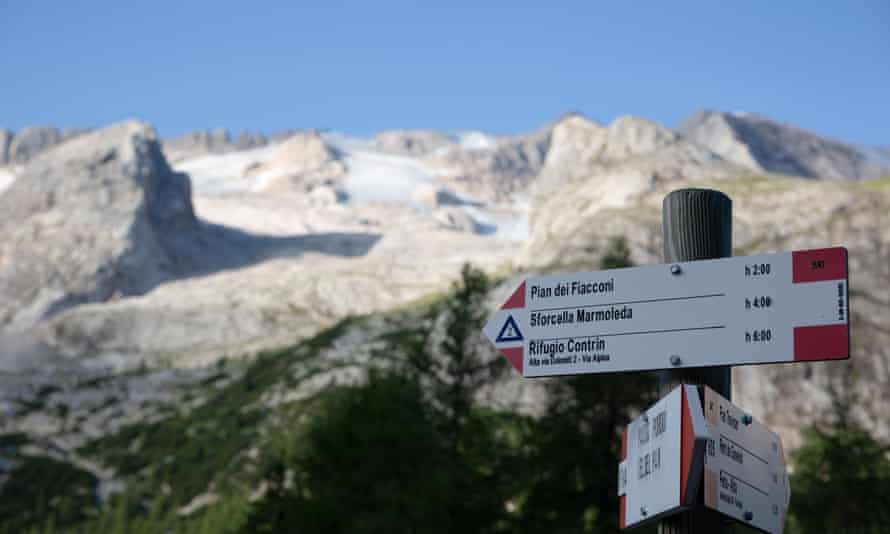begin quote from:
‘Within five minutes everything changed’: town mourns victims of glacier tragedy

Locals were closely aware of rapidly changing glacier but never anticipated catastrophe of this kind
ASunday climb on the Marmolada, the largest glacier in the northern Italian Dolomites, was only intended to be a warm-up for Filippo Bari and his friends before an even bigger challenge this weekend.
Such was the 27-year-old mountain climber’s joy at being on the glacier that he sent a selfie to his brother. Hours later, the father-of-one from the Veneto town of Malo, was among the first victims identified after a huge mass of the glacier broke off, sending an avalanche of ice, rocks and debris thundering down the slope and onto a popular hiking trail.
“He was a great man, so young, full of life and passion for the mountains,” said Lino Re, the president of the Malo unit of Cai, the Italian mountain climbers club of which Bari was a member. “We had an excursion to Monte Rosa, the second highest peak in the Alps after Mont Blanc, planned for this weekend and Filippo and his friends were preparing for that.”
Bari was on the Marmolada with a group of four climbers. One was injured in the avalanche and the other two are believed among the five still missing.
Seven people have so far been confirmed dead and eight injured, two seriously, in a tragedy that has shaken Canazei, the town closest to the Marmolada. Many of its 2,000 inhabitants were closely aware of the rapidly changing glacier but never anticipated a catastrophe of this kind.

“It’s hard to even put into words what has happened,” said Pietro Planchenstein. “Knowing these people lost their lives so close by, it’s terrible. The glacier has changed a lot; when I was a child I used to ski on it – in summer – now it’s impossible.”
Known as the Queen of the Dolomites, the Marmolada has lost more than 80% of its volume over the last 72 years, with the speed of its retreat hastening over the last decade. Italian scientists warned in 2020 that the glacier could disappear within 15 years because of global heating.
Rescuers resumed their search for the missing people on Tuesday morning, an operation that has been hampered by thunderstorms over the last 24 hours, although hope of finding them alive has diminished.
The victims so far identified include Tommaso Carollo, 48, and Paolo Dani, an Alpine guide. Some of the bodies can only be identified through DNA testing due to the nature of their deaths. They have been taken to a makeshift morgue at an ice-rink close to Canazei, where relatives of those still missing wait desperately for news.

All had ventured to the Marmolada on a splendidly sunny day. “The terrace was full of people,” said Lucia Novak, who works at Rifugio Marmolada, a mountain refuge and restaurant overlooking the glacier.
“I heard a noise, at around 2pm, and when I looked up I saw the avalanche, but didn’t realise then what it was. Within five minutes everything changed – we had this beautiful sunshine, but then it turned dark, cold and windy. I could see people walking down the slope, then nothing. I called the emergency services straight away. I’ve been working here since 2003 and have never seen anything like it.”

The Marmolada has been measured every year since 1902 and is considered a “natural thermometer” of climatic change but, according to Aldino Bondesan, a geophysics professor at the University of Padua and member of the Italian Glaciological Committee, there has never been a detailed study dedicated to the danger of it breaking away as falls of this type have never been registered.
He said a friend had gone to the glacier on Saturday and took photos close to the area of the tragedy. “Looking at the photos you don’t see evidence of large fractures that suggested it was in a condition that was more dangerous than at other moments,” Bondesan added.
Experts believe the heatwave that has gripped Italy since May, bringing temperatures unusually high for the start of summer even up in the normally cooler Alps, contributed to the pinnacle of the glacier breaking off and plummeting down the slope at a speed estimated at nearly 200mph (300km/h).
The winter was also unusually warm and snowfall significantly lower than the previous winter.
“It’s clear that if it’s very hot then the risk of suspended pieces of glacier breaking off is greater,” said Claudio Smiraglia, a glaciologist at the University of Milan. “There have been many cases on Mont Blanc, but on Mont Blanc there are areas, especially those popular with mountain climbers, where there is continuous monitoring. The most evident sign is a widening of crevasses, but this isn’t always so easy to grasp to the point where you perceive it as a danger and close off the mountain. But this heating has put glaciers in crisis and needs maximum attention.”
Re, who has been climbing mountains for over 30 years, had witnessed the Marmolada evolve at a worrying pace. “The glacier had already been reduced to a very sad level and has got progressively worse over the last decade,” he said. “The event on Sunday was exceptional; we can hope that such exceptional events will be few, but unfortunately there will be more to come.”
No comments:
Post a Comment